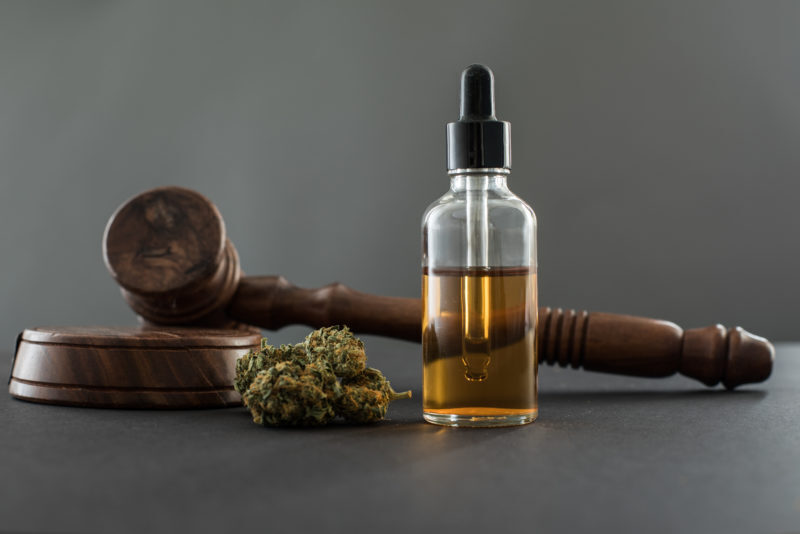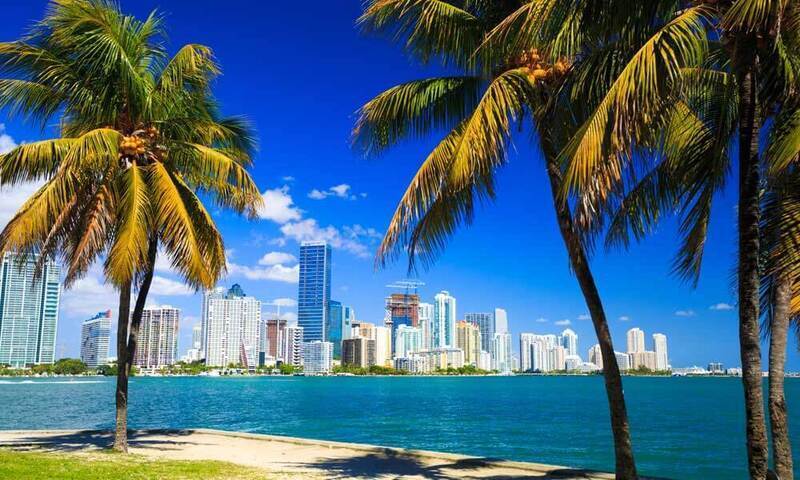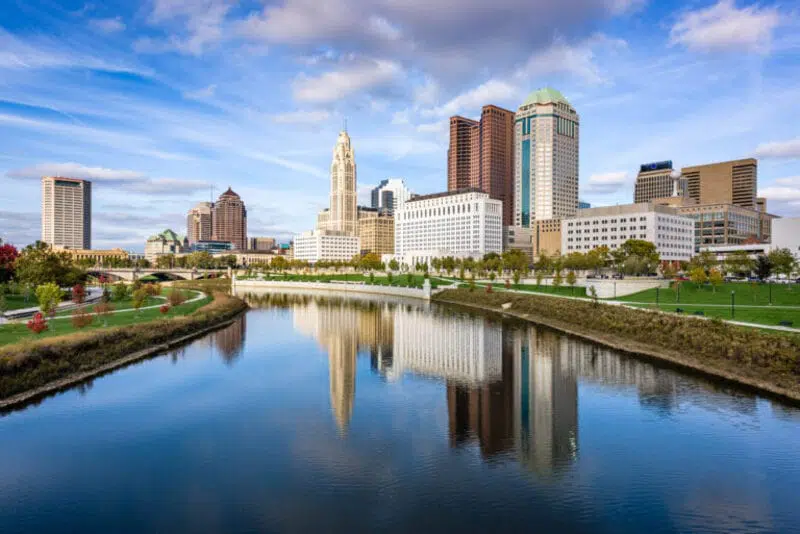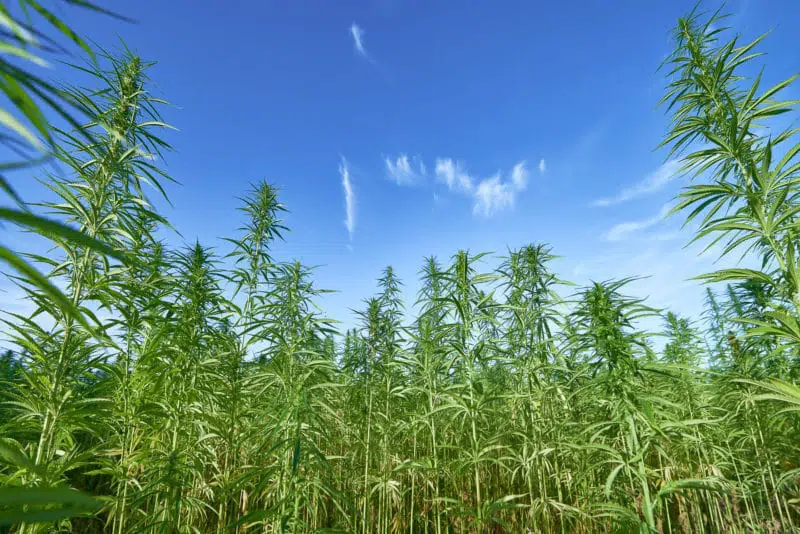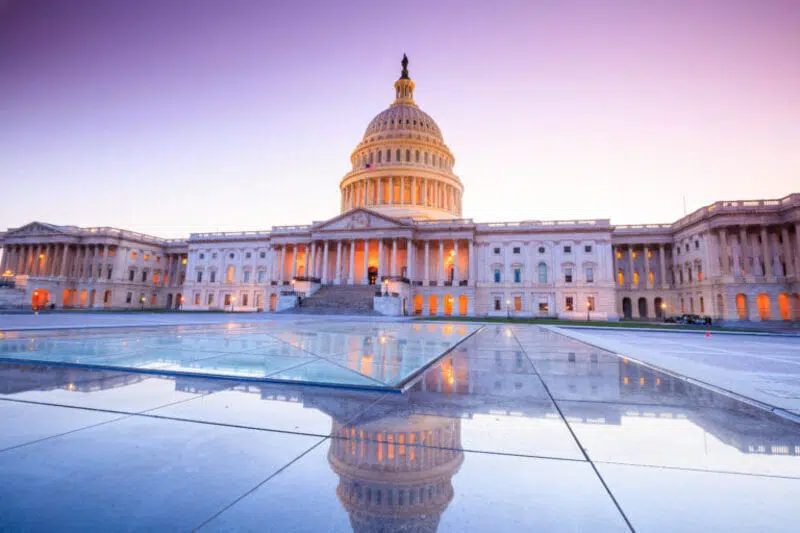-
- Market Research
- |
- CBD Near Me
- |
- Giveaways
- |
- Newsletter
- |
- Contact
- |
- Advertise
- |
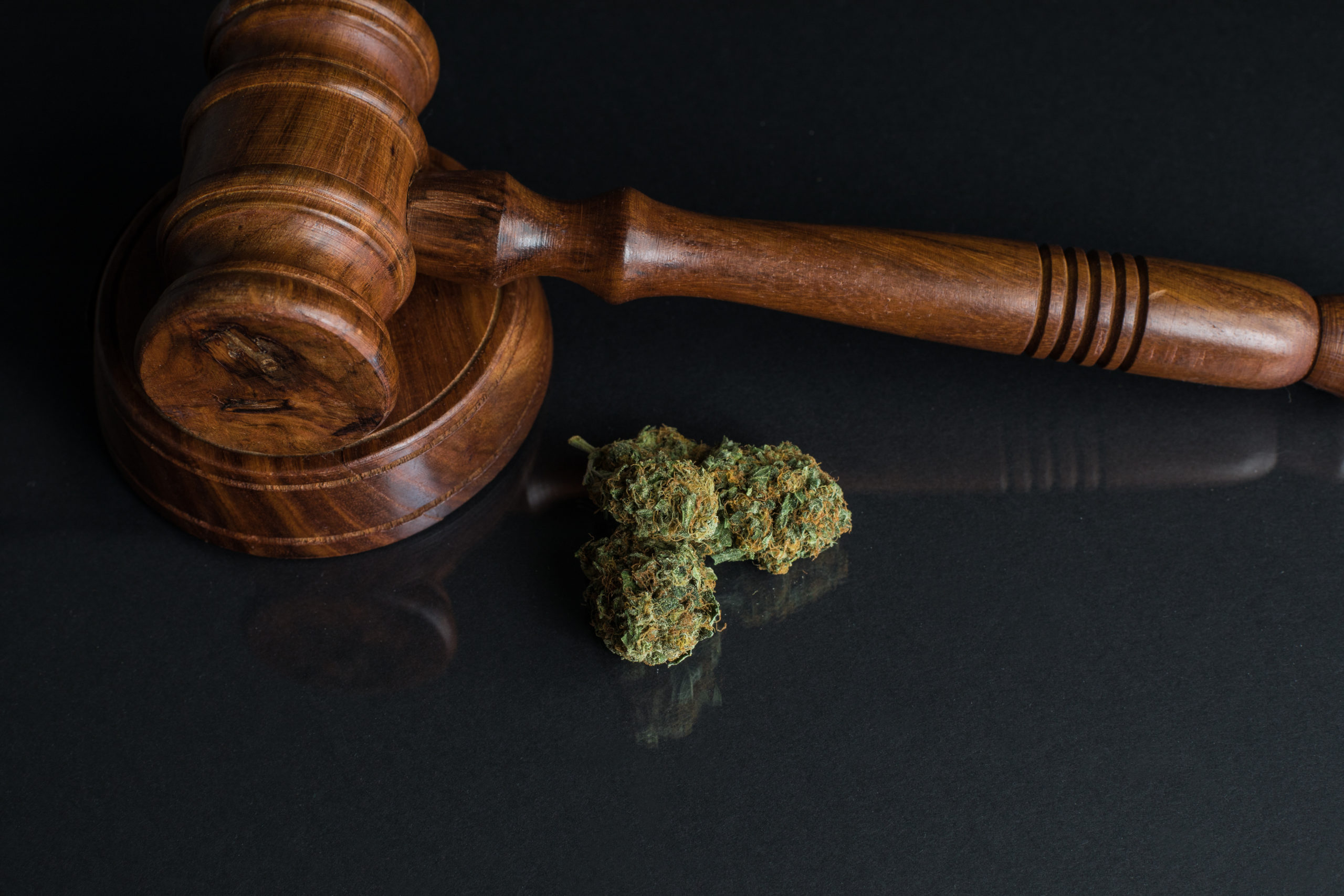
Yes, CBD is legal in most states. Although the 2018 Farm Bill created a CBD-friendly environment at the federal level, some states have passed variations of the federal law, affecting how their CBD markets are regulated.
Thus, CBD consumers should familiarize themselves with both federal and state rules. Overall, Americans have access to legal CBD products more now than ever.
(Click on the map to find out the legal status of CBD in your state.)
Table of Contents
- What is CBD?
- Agricultural Improvement Act of 2018
- Opinions of CBD by US Agencies
- Is CBD Legal in My State?
- Conclusion
What is CBD?
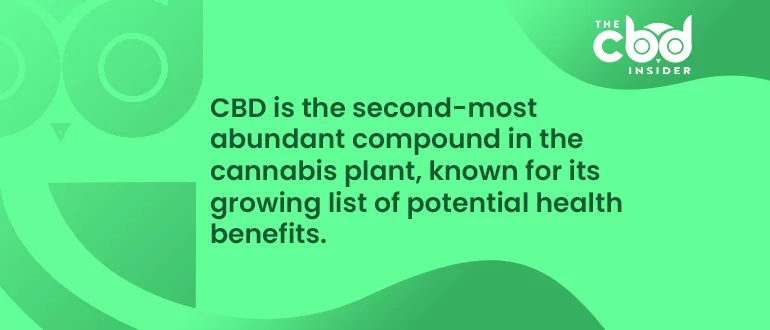
Cannabidiol, also known as CBD, is the second-most abundant compound in the cannabis plant. THC, the cannabinoid responsible for the euphoria associated with cannabis, is the most abundant.
The use of CBD has grown exponentially in the past five years. From health shops to convenience stores, CBD products can be found on retail shelves around the world today.
So why are droves of people trying CBD? It is due to the growing list of potential health benefits from this naturally occurring compound. Though more research is required to confirm its benefits, CBD users around the world laud CBD’s ability to provide relief from a multitude of health issues like pain, anxiety, sleep disorders, and more.
Another reason CBD has rapidly become a household term is because of the endless types of products that brands have infused with CBD. Users are able to consume CBD by sublingual tinctures, vapes, edibles, patches, capsules, creams, and even suppositories.
Will I get high from CBD?
No. Although CBD is closely related to THC, it does not maintain any of the psychoactive effects of THC. Under federal law, CBD products are permitted to have a maximum THC content of 0.3% unless purchased at a cannabis dispensary. Outside of dispensaries, CBD purchased at retailers will have minimal THC, thus, users will not experience euphoria.
Agricultural Improvement Act of 2018
The Agricultural Improvement Act of 2018, commonly known as the 2018 Farm Bill, changed the game for hemp farmers and CBD users by, amongst other things, removing hemp from the DEA’s controlled substances list.
According to the 2018 Farm Bill, a cannabis plant with less than 0.3% THC is now classified as hemp. If a cannabis plant has greater than 0.3% THC, then it remains in the controlled status as marijuana.
Thus, only CBD products derived from hemp are legal. If a CBD product is derived from marijuana, it’s illegal, regardless if it contains less than 0.3% of THC.
With most CBD products containing less than the federally allowed level of THC, the passing of this bill created a safe haven for CBD brands, users, and retailers.
Even with the passing of the 2018 Farm Bill at the federal level, some states have enacted stricter regulations than those found in the federal legislation. However, it seems that as more research is conducted on CBD, less users are being treated like criminals.
Opinions of CBD by US agencies
Despite the 2018 Farm Bill establishing the federal laws around hemp and CBD, US regulatory bodies have taken varying approaches to regulate CBD.
DEA
It took nearly 2 years after the passing of the 2018 Farm Bill for the U.S. Drug Enforcement Agency (DEA) to officially announce its interim final rule on hemp, which updated the agency’s regulations to conform with those of the 2018 Farm Bill.
However, confusion over the distinction between hemp and marijuana seems to still be prevalent. Events like the arrest of Aneudy Gonzalez who was transporting certified hemp are an example of how DEA remains by the new federal and state regulations on hemp.
FDA
The Food and Drug Administration (FDA) is also facing what appears to be internal confusion about how CBD should be treated. With the 2018 Farm Bill placing the onus of CBD regulation on the shoulders of the FDA, the agency has been slow and methodical in its approach.
The FDA has asked for more information about the safety and efficacy of CBD and claims that further FDA-approved research is needed. In response, Charlotte’s Web and other leading CBD brands have sponsored research on how continual usage of hemp-derived CBD affects the liver.
The agency has approved use of the CBD-based prescription drug, Epidiolex, produced by the pharmaceutical company Greenwich Biosciences, Inc. Epidiolex went through multiple clinical trials to confirm both its safety and efficacy.
USDA
The United States Department of Agriculture (USDA) issued its interim final rule on hemp in October of 2019. With much of the 2018 Farm Bill referencing hemp cultivation, USDA lobbyists have kept close tabs on attempts by other agencies to snuff out the industry.
The 2018 Farm Bill placed much of the regulatory burden on the USDA in terms of hemp farmers (hemp being the source of most CBD). The agency is routinely applauded by farmers and CBD users for their efforts to create an environment conducive to success in the hemp and CBD industries.
USPS
The United States Postal Service (USPS) has cleared the way for brands to ship CBD products nationwide with their minimally invasive requirements.
USPS asks only that CBD brands maintain documentation of third-party lab test results and proper licensing.
Is CBD legal in my state?
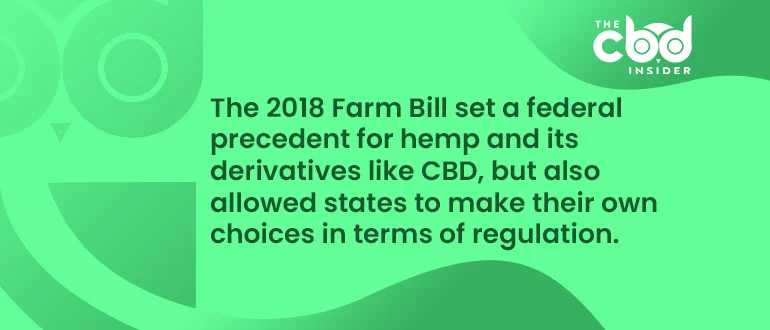
While the 2018 Farm Bill set a federal precedent for hemp and CBD regulation, it ultimately gave states the right to make their own choices in terms of regulation. In many situations, states may grant each county the ability to determine their rules. In any case, you should always check with your local municipalities for any rules that may be specific to your county.
Alabama
- CBD derived from hemp: Legal
- CBD derived from marijuana: Limited
- Prescription required for hemp-derived CBD: No
Alabama openly adopted the regulations set forth by the 2018 Farm Bill. Additionally, Alabama allows marijuana-derived CBD for seizure control in doctor prescribed settings under Carly’s Law. Furthermore, the passing of Leni’s Law in 2016 granted the right for parents and guardians to be in possession of their child’s prescribed marijuana-derived CBD.
Alaska
- CBD derived from hemp: Legal
- CBD derived from marijuana: Legal
- Prescription required for hemp-derived CBD: No
Having legalized cannabis entirely, Alaska remains CBD friendly. The one exception is CBD-infused food and beverages are not permitted.
Arizona
- CBD derived from hemp: Legal
- CBD derived from marijuana: Limited
- Prescription required for hemp-derived CBD: No
Arizona’s regulators have been battling with CBD since the passage of the 2018 Farm Bill. Hemp-derived CBD products don’t face as much scrutiny as those derived from marijuana. Under the Arizona medical cannabis program, individuals should have access to marijuana-derived CBD products; however, there seems to be conflicting views of this by Arizona regulators.
Regardless of the source, Arizona does not permit CBD-infused food or beverages.
Arkansas
- CBD derived from hemp: Legal
- CBD derived from marijuana: Limited
- Prescription required for hemp-derived CBD: No
While Arkansas does not allow the use of CBD in food or beverages, they otherwise remain CBD friendly. Their medical marijuana program also allows for the use of CBD products derived from marijuana by registered patients.
California
- CBD derived from hemp: Legal
- CBD derived from marijuana: Legal
- Prescription required for hemp-derived CBD: No
Being one of the more cannabis friendly states, California has been mostly open to CBD. Much like many other states, California’s only caveat is disallowing CBD in food and beverages, set forth by the California Department of Health. However, a bill to overturn this policy has failed for two years straight in the California legislature.
Colorado
- CBD derived from hemp: Legal
- CBD derived from marijuana: Legal
- Prescription required for hemp-derived CBD: No
With Colorado being a frontrunner in overall cannabis legalization, it is no surprise that they maintain an open market for CBD. The only exception is that CBD is not permitted for use in baked goods.
Connecticut
- CBD derived from hemp: Legal
- CBD derived from marijuana: Limited
- Prescription required for hemp-derived CBD: No
Connecticut is seen as a CBD friendly state and allows registered patients with the state’s medical marijuana program to use marijuana-derived CBD. Food and beverages infused with CBD must be registered with the state.
Delaware
- CBD derived from hemp: Legal
- CBD derived from marijuana: Limited
- Prescription required for hemp-derived CBD: No
Delaware residents have no issues when it comes to accessing CBD products in their state. With Delaware’s medical cannabis program in full swing, registered medical marijuana patients can also gain access to marijuana-derived CBD oil as long as the THC concentration is no more than 7%.
Florida
- CBD derived from hemp: Legal
- CBD derived from marijuana: Limited
- Prescription required for hemp-derived CBD: No
Florida is quickly joining the CBD movement like many other states. Hemp-derived CBD products are fully permitted (though labeling is regulated in Florida) and marijuana-derived CBD may be prescribed to registered patients with qualifying conditions under the Florida medical cannabis program.
Georgia
- CBD derived from hemp: Legal
- CBD derived from marijuana: Limited
- Prescription required for hemp-derived CBD: No
Georgia permits hemp-derived CBD products (with the exception of food/beverage products) as well as the use of marijuana-derived CBD oil containing less than 5% THC for qualified medical patients.
Hawaii
- CBD derived from hemp: Legal
- CBD derived from marijuana: Limited
- Prescription required for hemp-derived CBD: No
Hawaii has no restrictions on hemp-derived CBD products. In terms of marijuana-derived CBD products, these are permitted as long as the user is a registered medical marijuana patient in the state.
Idaho
- CBD derived from hemp: Illegal
- CBD derived from marijuana: Illegal
- Prescription required for hemp-derived CBD: N/A
Idaho remains one of the few states with a complete CBD ban in place. Epidiolex is the only CBD-based product available, which requires a doctor’s prescription.
Illinois
- CBD derived from hemp: Legal
- CBD derived from marijuana: Legal
- Prescription required for hemp-derived CBD: No
In January 2020, Illinois established laws that granted access to adult-use recreational cannabis. For CBD users, this means that CBD products may be sourced from hemp or marijuana. Currently, there are no restrictions on the types of products that brands can infuse with CBD.
Indiana
- CBD derived from hemp: Legal
- CBD derived from marijuana: Illegal
- Prescription required for hemp-derived CBD: No
Following precedent of the 2018 Farm Bill, Indiana permits the use of hemp-derived CBD products. They also have labeling regulations in place. CBD sourced from marijuana is strictly prohibited in the state.
Iowa
- CBD derived from hemp: Limited
- CBD derived from marijuana: Limited
- Prescription required for hemp-derived CBD: Yes
Iowa does not permit any CBD products unless the patient is registered with the state’s medical CBD program. This limited program requires that patients meet one of just a few qualifying conditions before being permitted to use a CBD product containing no more than 3% THC.
Kansas
- CBD derived from hemp: Legal
- CBD derived from marijuana: Illegal
- Prescription required for hemp-derived CBD: No
Following the lead of the 2018 Farm Bill, Kansas permits hemp-derived CBD products. Those derived from marijuana still remain prohibited. Kansas also prohibits the addition of CBD in any food or beverage.
Kentucky
- CBD derived from hemp: Legal
- CBD derived from marijuana: Illegal
- Prescription required for hemp-derived CBD: No
Kentucky permits CBD extracted from hemp though they maintain a unique stance on the types of CBD products permitted for sale. Along with prohibiting marijuana-derived CBD, KY lawmakers have banned the sale of:
- Hemp Cigarettes
- Hemp Cigars
- Hemp Chew/Dip
- Hemp Leaf
- Hemp Teas
Louisiana
- CBD derived from hemp: Legal
- CBD derived from marijuana: Limited
- Prescription required for hemp-derived CBD: No
Louisiana allows users to purchase hemp-derived CBD products without issue. However, using CBD derived from marijuana or containing more than 0.3% THC requires that individuals be part of the Louisiana medical cannabis program.
Maine
- CBD derived from hemp: Legal
- CBD derived from marijuana: Legal
- Prescription required for hemp-derived CBD: No
Maine has minimal restrictions in terms of CBD products. With a well-established adult-use cannabis program in place, Maine residents interested in CBD should have no problem purchasing CBD products.
Maryland
- CBD derived from hemp: Legal
- CBD derived from marijuana: Limited
- Prescription required for hemp-derived CBD: No
Individuals residing in Maryland have little resistance to using hemp-derived CBD products. However, if you’re a Maryland resident and want to use marijuana-derived CBD, you will first need to register with the Maryland Medical Cannabis Commission.
Massachusetts
- CBD derived from hemp: Legal
- CBD derived from marijuana: Legal
- Prescription required for hemp-derived CBD: No
Massachusetts presents little in the way of CBD restrictions for its residents. Being that they permit adult-use of cannabis, Massachusetts allows CBD products derived from either hemp or marijuana. However, state regulators require a purity analysis to be performed on food or beverage products containing CBD.
Michigan
- CBD derived from hemp: Legal
- CBD derived from marijuana: Legal
- Prescription required for hemp-derived CBD: No
The only restriction that Michigan residents will face is the prohibition of CBD in food or beverages. Having allowed recreational cannabis since 2018, Michigan permits CBD products extracted from both hemp and marijuana.
Minnesota
- CBD derived from hemp: Legal
- CBD derived from marijuana: Limited
- Prescription required for hemp-derived CBD: No
Aside from prohibition of CBD use in food or beverages, Minnesota presents no issue with individuals who want to use hemp-derived CBD products. If you prefer CBD derived from marijuana, you’ll need to be a registered patient of the state’s medical cannabis program.
Mississippi
- CBD derived from hemp: Legal
- CBD derived from marijuana: Limited
- Prescription required for hemp-derived CBD: No
Mississippi residents are free to purchase and use hemp-derived CBD products as long as the product maintains a 20:1 CBD:THC ratio. This may sound like a confusing hurdle but in reality, most hemp-derived CBD products vastly exceed this criteria. For qualifying medical cannabis patients, CBD products may be derived from marijuana, but they must contain greater than 15% CBD and no more than 0.5% THC.
Missouri
- CBD derived from hemp: Legal
- CBD derived from marijuana: Limited
- Prescription required for hemp-derived CBD: No
One of the few states enforcing age restrictions on hemp-derived CBD, Missouri residents must be at least 18 years old to purchase hemp-derived CBD products. Furthermore, marijuana-derived CBD products are limited to registered medical cannabis patients with qualifying conditions.
Montana
- CBD derived from hemp: Legal
- CBD derived from marijuana: Limited
- Prescription required for hemp-derived CBD: No
Montana follows many other states in its allowance of hemp-derived CBD in all products except food and beverages. Only patients registered with the state’s medical cannabis program qualify for marijuana-derived CBD.
Nebraska
- CBD derived from hemp: Illegal
- CBD derived from marijuana: Illegal
- Prescription required for hemp-derived CBD: N/A
The only form of CBD allowed in the state is the physician prescribed Epidiolex. The Nebraska Attorney General believes that CBD is still no different than marijuana.
Nevada
- CBD derived from hemp: Legal
- CBD derived from marijuana: Legal
- Prescription required for hemp-derived CBD: No
Nevada’s adult-use laws have paved the way for CBD products derived from hemp or marijuana. The only restrictions currently in place are that CBD cannot be added to food or beverages and CBD products may only be sold in cannabis dispensaries.
New Hampshire
- CBD derived from hemp: Legal
- CBD derived from marijuana: Limited
- Prescription required for hemp-derived CBD: No
New Hampshire currently has no restrictions on hemp-derived CBD products. CBD derived from marijuana, however, is prohibited unless the user is registered with the state’s medical cannabis program.
New Jersey
- CBD derived from hemp: Legal
- CBD derived from marijuana: Limited
- Prescription required for hemp-derived CBD: No
Like many states, New Jersey has no limitations on hemp-derived CBD. If individuals would like to use CBD derived from marijuana, they will need to meet qualifications to register with the state’s Division of Medicinal Marijuana.
New Mexico
- CBD derived from hemp: Legal
- CBD derived from marijuana: Limited
- Prescription required for hemp-derived CBD: No
New Mexico residents are permitted to purchase and use CBD products derived from hemp with no restrictions. However, marijuana-sourced CBD will require registration in the state’s medical cannabis program.
New York
- CBD derived from hemp: Legal
- CBD derived from marijuana: Limited
- Prescription required for hemp-derived CBD: No
New York’s CBD rules are similar to Massachusetts by requiring a laboratory purity analysis on CBD products. The state does not allow CBD infused in food or beverages and possession of marijuana-derived CBD requires the individual to be a registered New York medical cannabis patient.
North Carolina
- CBD derived from hemp: Legal
- CBD derived from marijuana: Limited
- Prescription required for hemp-derived CBD: Variable
North Carolinians are permitted to use any hemp-derived CBD product, except CBD-infused food or beverages. Though marijuana-derived CBD is strictly prohibited, medical professionals are allowed to prescribe CBD products with 0.9% THC for intractable seizures. This prescribed CBD must also contain a 5% CBD concentration at minimum.
North Dakota
- CBD derived from hemp: Legal
- CBD derived from marijuana: Limited
- Prescription required for hemp-derived CBD: No
Those living in North Dakota have open access to CBD products as long as it’s hemp-derived CBD. To qualify for marijuana-based CBD, residents must first register with the state’s medical cannabis program.
Ohio
- CBD derived from hemp: Legal
- CBD derived from marijuana: Limited
- Prescription required for hemp-derived CBD: No
Currently, hemp-derived CBD products are permitted with no restriction in Ohio and marijuana-derived CBD is available for registered patients in the state’s medical cannabis program.
Oklahoma
- CBD derived from hemp: Legal
- CBD derived from marijuana: Limited
- Prescription required for hemp-derived CBD: No
Residents of Oklahoma can easily access CBD products as long as they are sourced from hemp. With the state’s medical cannabis program, registered patients can also purchase marijuana-derived CBD products.
Oregon
- CBD derived from hemp: Legal
- CBD derived from marijuana: Legal
- Prescription required for hemp-derived CBD: No
The only limitations that residents of Oregon will face in terms of CBD products are labeling regulations. Outside of this, Oregon’s adult-use cannabis market has opened the doors for both hemp- and marijuana-sourced CBD.
Pennsylvania
- CBD derived from hemp: Legal
- CBD derived from marijuana: Limited
- Prescription required for hemp-derived CBD: No
CBD from hemp is permitted in Pennsylvania so long as it is not used in a food or beverage product and follows CBD labeling regulations. Pennsylvania’s medical cannabis program opens access to marijuana-derived CBD for registered patients.
Rhode Island
- CBD derived from hemp: Legal
- CBD derived from marijuana: Limited
- Prescription required for hemp-derived CBD: No
Rhode Island permits the possession and use of CBD products sourced from hemp. Outside of labeling guidelines, residents shouldn’t expect any limitations when purchasing their CBD products. As with most other states, Rhode Island residents who wish to use CBD that is marijuana-derived must first become part of the state’s medical cannabis program.
South Carolina
- CBD derived from hemp: Legal
- CBD derived from marijuana: Illegal
- Prescription required for hemp-derived CBD: Variable
South Carolina’s lack of a medical cannabis program means that residents won’t have access to CBD products derived from marijuana. That said, state regulators have opened the doors for hemp-derived CBD products with the exception of food and beverages.
Furthermore, with the passing of Julian’s Law in 2014, physicians are now permitted to prescribe CBD products with up to 0.9% THC for patients diagnosed with forms of epilepsy. These prescribed products must contain at least 98% CBD.
South Dakota
- CBD derived from hemp: Legal
- CBD derived from marijuana: Illegal
- Prescription required for hemp-derived CBD: No
South Dakota considered any CBD product a schedule I controlled substance as recently as January 2019. Later, the South Dakota Health and Human Services committee provided CBD guidance for residents. This amendment served as clarification that hemp-derived CBD derived is legal.
Tennessee
- CBD derived from hemp: Legal
- CBD derived from marijuana: Illegal
- Prescription required for hemp-derived CBD: Variable
Residents of Tennessee can purchase any hemp-derived CBD product type. Much like the Carolinas, Tennessee permits licensed physicians to prescribe CBD oil with up to 0.9% THC for treatment of intractable epilepsy.
Texas
- CBD derived from hemp: Legal
- CBD derived from marijuana: Illegal
- Prescription required for hemp-derived CBD: Variable
As long as labeling guidelines are followed and the CBD is derived from hemp, there are no other limitations on CBD products for Texans. Medical providers are permitted to prescribe products with no more than 0.5% THC and at minimum 10% CBD for cases of intractable epilepsy.
Utah
- CBD derived from hemp: Legal
- CBD derived from marijuana: Limited
- Prescription required for hemp-derived CBD: No
Utah’s approach to CBD products is like many other states with medical cannabis programs in place. Hemp-derived CBD is fully permitted and marijuana-derived CBD products require individuals to be a registered patient of the state’s medical cannabis program.
Vermont
- CBD derived from hemp: Legal
- CBD derived from marijuana: Legal
- Prescription required for hemp-derived CBD: No
With only labeling restrictions in place, CBD products in Vermont may be sourced from hemp or marijuana without further restriction.
Virginia
- CBD derived from hemp: Legal
- CBD derived from marijuana: Limited
- Prescription required for hemp-derived CBD: No
CBD products are fully permitted as long as they are hemp-derived. In the event that an individual wishes to use CBD products derived from marijuana, they will be required to qualify and register for the state’s medical cannabis program.
Washington
- CBD derived from hemp: Legal
- CBD derived from marijuana: Legal
- Prescription required for hemp-derived CBD: No
Being the second state to legalize recreational cannabis, it should serve as no surprise that Washington fully embraces CBD products regardless of the source of the CBD. The only restriction is the prohibition of CBD-infused food and beverages.
Washington, D.C.
- CBD derived from hemp: Legal
- CBD derived from marijuana: Legal
- Prescription required for hemp-derived CBD: No
With the legalization of recreational cannabis use in Washington D.C., there are no barriers regarding the source of CBD. However, current legislation doesn’t allow cannabis dispensaries to open within the city.
This leaves D.C. residents with limited options for marijuana-sourced CBD products. However, hemp-derived CBD is widely available.
West Virginia
- CBD derived from hemp: Legal
- CBD derived from marijuana: Limited
- Prescription required for hemp-derived CBD: No
West Virginia permits hemp-derived CBD but does not allow CBD-infused food and beverages. Marijuana-derived CBD products are permitted under the requirement that the user is registered with the state’s medical cannabis program.
Wisconsin
- CBD derived from hemp: Legal
- CBD derived from marijuana: Limited
- Prescription required for hemp-derived CBD: No
Wisconsin prohibits the use of CBD in food or beverages and requires that CBD be hemp-derived. Otherwise, CBD products are fully permitted. Users opting for marijuana-derived CBD will need to register with the state’s medical cannabis program.
Wyoming
- CBD derived from hemp: Legal
- CBD derived from marijuana: Illegal
- Prescription required for hemp-derived CBD: No
The only restriction in Wyoming is that CBD be sourced from hemp.
Guam
- CBD derived from hemp: Legal
- CBD derived from marijuana: Limited
- Prescription required for hemp-derived CBD: No
Guam residents have full access to all CBD products that are sourced from hemp. While cannabis-derived CBD products are permitted for registered patients of Guam’s medical cannabis program, the Pacific island’s Cannabis Control Board has yet to permit any licensed dispensaries to open.
Puerto Rico
- CBD derived from hemp: Legal
- CBD derived from marijuana: Limited
- Prescription required for hemp-derived CBD: No
Residents of Puerto Rico face no restrictions to hemp-derived CBD. If users wish to purchase marijuana-derived CBD, like most other locations, they will need to be registered as a medical cannabis patient in Puerto Rico.
Conclusion
The passing of the 2018 Farm Bill created a very accessible market for CBD users. With CBD products now available at a wide range of retailers, CBD is quickly becoming a household staple.
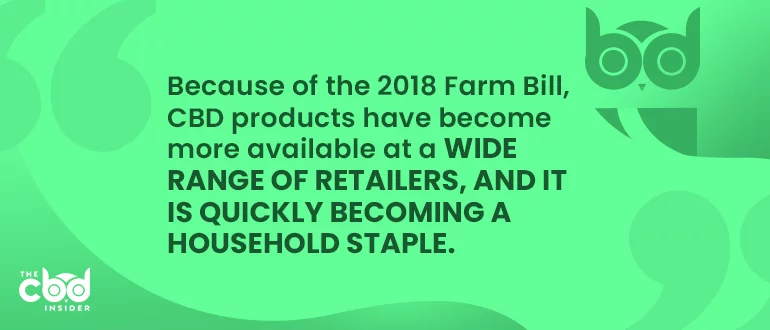
We understand that there is a lot of information about CBD, which is why we have put together several tools to assist in making your purchase decisions. Our Trusted Brands resource is an excellent place to begin. We’ve taken the guesswork out of choosing your CBD products by vetting countless CBD brands and compiling an easy-to-understand summary of each brand.
If you’re already loyal to a CBD brand, then we recommend taking a moment to sign up for our newsletter for up to date CBD news and product reviews.


